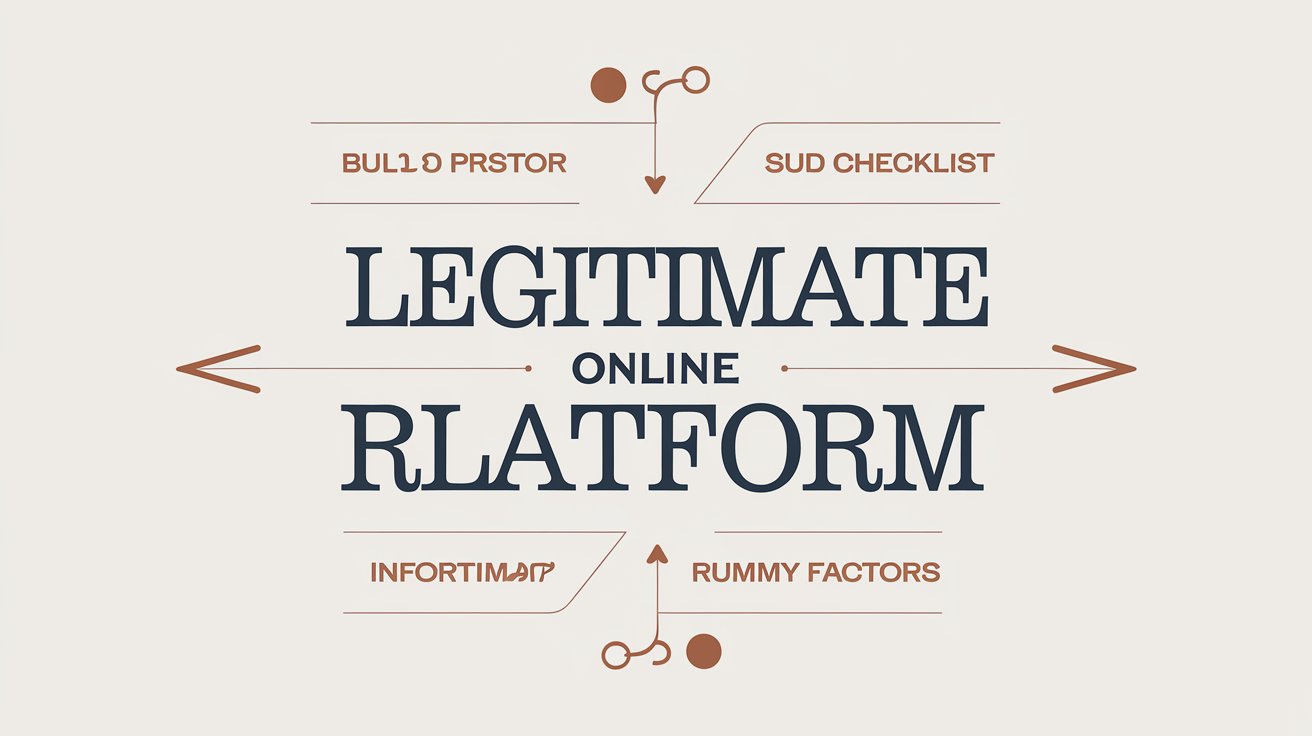With the rising popularity of online rummy, players are faced with a critical challenge: distinguishing legitimate platforms from questionable ones. The digital landscape is filled with numerous rummy sites and apps, but not all operate with the same standards of fairness, security, and reliability. This comprehensive guide will help you identify trustworthy online rummy platforms where you can enjoy your favorite card game with peace of mind.
Why Legitimacy Matters in Online Rummy

Before diving into specific indicators, it’s important to understand why choosing a legitimate platform is crucial:
- Financial Security: Your deposits and winnings are protected
- Fair Gameplay: Games are conducted with genuine randomness and without manipulation
- Data Protection: Your personal and payment information remains secure
- Dispute Resolution: Clear processes exist for addressing concerns
- Legal Compliance: The platform operates within applicable laws and regulations
Playing on illegitimate platforms puts you at risk of financial loss, identity theft, and unfair gaming experiences. The time invested in proper research can save significant headaches later.
Essential Indicators of Legitimate Rummy Platforms

1. Proper Licensing and Regulation
Perhaps the most fundamental indicator of legitimacy is appropriate licensing:
What to Look For
- Visible License Information: Legitimate platforms prominently display their licensing details
- Regulatory Authority: Check which gaming authority has issued the license
- Verification Options: Ability to verify license status through official regulatory websites
- Jurisdiction Clarity: Clear information about where the platform is legally registered
- Compliance Statements: Transparent disclosure of regulatory compliance measures
Where to Find This Information
Look for license information in the platform’s footer, ‘About Us’ section, or dedicated pages like ‘Legal’ or ‘Compliance’. Legitimate operations have nothing to hide and make this information easily accessible.
2. Robust Security Measures
Legitimate platforms invest heavily in security to protect both their users and their reputation:
Technical Security Indicators
- SSL Encryption: Secure connection indicated by padlock icon and HTTPS in the URL
- Two-Factor Authentication (2FA): Additional security layer beyond passwords
- Data Protection Policies: Comprehensive privacy policies detailing data handling practices
- Regular Security Audits: Information about independent security assessments
- Secure Payment Gateways: Integration with reputable payment processors
User Security Features
- Account Verification Processes: KYC (Know Your Customer) procedures to prevent fraud
- Responsible Gaming Tools: Options for setting limits, self-exclusion, and cooling-off periods
- Fraud Prevention Measures: Systems to detect and prevent suspicious activities
- Secure Password Requirements: Enforcement of strong password practices
3. Transparent Terms and Conditions
Legitimate platforms have clear, fair, and accessible terms:
What to Examine
- Comprehensive Game Rules: Detailed explanation of how games are conducted
- Transparent Fee Structure: Clear information about platform fees or commissions
- Withdrawal Policies: Straightforward explanation of how and when you can access winnings
- Bonus Conditions: Honest disclosure of any requirements attached to promotional offers
- Account Closure Terms: Fair process for closing accounts and withdrawing remaining funds
Red Flags in Terms
- Excessive Withdrawal Restrictions: Unreasonable minimum withdrawal amounts or timeframes
- Vague Cancellation Policies: Unclear terms about account termination
- Ambiguous Game Rules: Rules that leave room for interpretation or platform advantage
- Hidden Fees: Charges that aren’t clearly disclosed upfront
- Unrealistic Bonus Requirements: Promotions with virtually impossible conditions
4. Fair Gaming Practices
Legitimate platforms ensure game integrity and fairness:
Fairness Indicators
- Random Number Generator (RNG) Certification: Information about certified random card dealing
- Independent Testing: Verification by third-party testing agencies like eCOGRA or iTech Labs
- Published Return-to-Player (RTP) Rates: Transparency about game economics
- Anti-Collusion Measures: Systems to prevent player cooperation against others
- Bot Prevention: Protections against automated play that could disadvantage human players
Transparency in Operations
- Game Logs: Ability to review your game history in detail
- Shuffling Mechanics: Clear explanation of how cards are shuffled digitally
- Result Verification: Methods to verify game outcomes were fair and random
- Regular Audits: Information about routine checks of game fairness
5. Responsive Customer Support
Quality customer service is a hallmark of legitimate operations:
Support Indicators
- Multiple Contact Channels: Various ways to reach support (live chat, email, phone)
- Operating Hours: Clearly stated customer service availability
- Response Time Expectations: Information about how quickly to expect assistance
- Support in Multiple Languages: Assistance available in languages the platform serves
- Dedicated Support Staff: Evidence of knowledgeable, trained support personnel
Quality Assessment
- Test Response Times: Send a simple query to gauge responsiveness
- Check Support Knowledge: Ask a technical question to evaluate expertise
- Observe Professionalism: Note the quality and tone of communication
- Review Resolution Processes: Examine how disputes or issues are handled
6. Positive Reputation and Reviews
A platform’s track record speaks volumes about its legitimacy:
Reputation Research
- Independent Review Sites: Check specialized rummy or gaming review platforms
- Player Forums: Visit community discussions about online rummy experiences
- Social Media Feedback: Examine comments on the platform’s social media presence
- App Store Ratings: Review ratings and comments on mobile app stores
- Complaint History: Search for patterns of issues or unresolved complaints
Evaluating Reviews
- Look for Specifics: Detailed reviews tend to be more reliable than vague praise or criticism
- Note Patterns: Consistent complaints about specific issues warrant caution
- Consider Timing: Recent reviews are more relevant than older ones
- Assess Responses: How the platform responds to negative feedback is telling
- Check Multiple Sources: Cross-reference information across different review platforms
7. Professional Design and User Experience
Legitimate platforms invest in quality presentation:
Design Elements to Assess
- Professional Website/App: Polished, error-free interface
- Functional Navigation: Intuitive menu structure and user flow
- Brand Consistency: Uniform design elements across platforms
- Regular Updates: Ongoing improvements and maintenance
- Compatible Across Devices: Proper functioning on various screen sizes
Performance Indicators
- Loading Speed: Pages and games load efficiently
- Transaction Processing: Smooth, error-free payment processes
- Game Stability: Minimal crashes or freezes during play
- Responsive Design: Proper adaptation to different devices
- Minimal Advertising: Not overwhelmed with intrusive ads
8. Responsible Gaming Commitment
Legitimate platforms prioritize player wellbeing:
Responsible Gaming Features
- Deposit Limits: Ability to set daily, weekly, or monthly deposit caps
- Self-Exclusion Options: Tools to temporarily or permanently block access
- Reality Checks: Reminders about time spent playing
- Cooling-Off Periods: Options to take short breaks from play
- Session Time Limits: Ability to restrict playing time
Educational Resources
- Problem Gambling Information: Resources about recognizing problematic play
- Links to Support Organizations: Connections to gambling addiction help services
- Self-Assessment Tools: Questionnaires to evaluate personal gaming habits
- Clear Gaming Policies: Explicit statements about responsible gaming philosophy
- Age Verification: Strict enforcement of minimum age requirements
9. Transparent Company Information
Legitimate platforms are open about their corporate identity:
Company Transparency
- Clear Ownership: Information about who owns and operates the platform
- Physical Address: Real business location, not just a P.O. box
- Company Registration: Business registration details
- Executive Team: Information about key company leadership
- Contact Information: Multiple ways to reach the company
Corporate Responsibility
- About Us Page: Comprehensive information about the company’s history and mission
- Terms of Service: Clear legal documents outlining the business relationship
- Privacy Policy: Detailed explanation of data collection and usage practices
- Cookie Policy: Transparent information about website tracking
- Affiliate Disclosure: Clear policies about marketing relationships
10. Secure and Diverse Payment Options
Legitimate platforms offer safe, convenient financial transactions:
Payment Features
- Multiple Payment Methods: Various options for deposits and withdrawals
- Recognized Payment Processors: Integration with reputable financial services
- Reasonable Minimums/Maximums: Fair limits on transaction amounts
- Transaction Timeframes: Clear information about processing times
- Fee Transparency: Upfront disclosure of any transaction fees
Financial Security
- Payment Encryption: Secure processing of financial information
- Segregated Funds: Player funds kept separate from operational accounts
- Identity Verification: Proper procedures to prevent fraud
- Transaction Receipts: Documentation of all financial activities
- Withdrawal Verification: Reasonable identity checks for large withdrawals
Red Flags: Warning Signs of Illegitimate Platforms

While looking for positive indicators, also be vigilant for these warning signs:
Suspicious Operational Practices
- No License Information: Absence of clear licensing details
- Unrealistic Promises: Guarantees of winning or exaggerated return rates
- Copy-Paste Websites: Platforms that look like clones of established sites
- Frequent Domain Changes: Platforms that regularly switch web addresses
- No Company Information: Lack of clear details about who operates the platform
Concerning Game Integrity
- Patterns of Unusual Results: Consistently improbable card distributions
- Reports of Rigged Games: Multiple user complaints about fairness
- No RNG Certification: No information about random number generation
- Player Collusion: Evidence of players working together against others
- Sudden Game Disconnections: Frequent disconnects during winning situations
Problematic Financial Practices
- Withdrawal Difficulties: Consistent problems accessing winnings
- Changing Terms: Frequent modifications to payment policies
- Excessive Fees: Unreasonable charges for basic transactions
- Limited Banking Options: Very few or obscure payment methods
- Bonus Traps: Promotions designed to prevent withdrawals
How to Conduct Your Own Due Diligence
Before committing to any online rummy platform, follow these steps:
Step 1: Background Research
- Search for the platform name along with terms like “review,” “scam,” or “legitimate”
- Check specialized online gaming forums for player experiences
- Research the parent company’s reputation and history
- Look for news articles or press releases about the platform
Step 2: License Verification
- Identify the licensing authority mentioned on the platform
- Visit the regulator’s official website to verify the license
- Check if the license is current and in good standing
- Research the reputation of the licensing jurisdiction
Step 3: Security Assessment
- Verify the website has SSL encryption (https://)
- Check for security certifications or partnership logos
- Review the privacy policy for data protection measures
- Assess password requirements and account security features
Step 4: Test Customer Support
- Send a pre-registration inquiry to gauge responsiveness
- Ask specific questions about game rules or payment processes
- Note the quality and helpfulness of the response
- Check if support is available through multiple channels
Step 5: Start Small
- Begin with a minimal deposit to test the platform
- Try both depositing and withdrawing small amounts
- Play different game variants to assess overall fairness
- Monitor account security and communication practices
Conclusion: Making an Informed Choice
Selecting a legitimate online rummy platform requires careful consideration of multiple factors. While no single indicator can guarantee legitimacy, the combination of proper licensing, robust security, transparent policies, fair gaming practices, and positive reputation provides strong assurance of a trustworthy platform.
By conducting thorough research and remaining vigilant for warning signs, you can significantly reduce the risks associated with online gaming. Remember that legitimate platforms prioritize player protection and fair play—they want to build long-term relationships with satisfied customers rather than short-term profits through questionable practices.
Take your time in selecting a platform, as the decision directly impacts your gaming enjoyment, financial security, and personal data protection. The extra effort invested in finding a legitimate platform will pay dividends in a safer, more enjoyable online rummy experience.
With the knowledge gained from this guide, you’re now better equipped to distinguish between legitimate online rummy platforms and those that should be avoided. Happy playing, and may your cards always form the perfect sequence!

Zareb Saleh is a journalist at Gulf Today and a ghostwriter for Gameoholic, specializing in gaming, technology, and digital culture. With a keen eye for industry trends, he delivers insightful stories that engage and inform readers.




